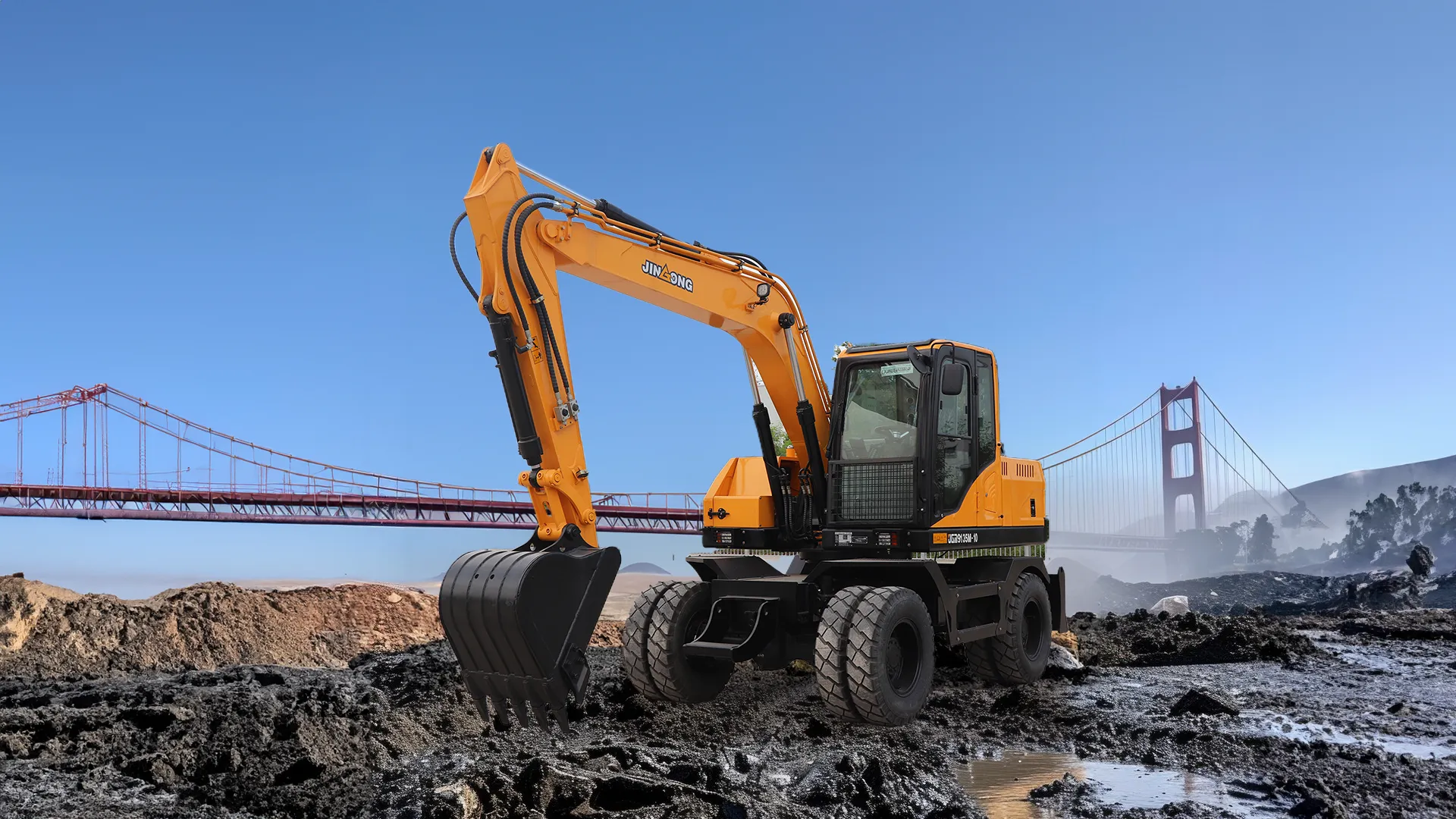Essential Maintenance Tips to Keep Your Skid Steer Excavator Running Smoothly
Essential Maintenance Tips to Keep Your Skid Steer Excavator Running Smoothly
Table of Contents
Introduction
The Importance of Regular Maintenance
Daily Maintenance Checks
Weekly Maintenance Tasks
Monthly Maintenance Tasks
Seasonal Maintenance Tips
Troubleshooting Common Issues
When to Call a Professional for Repairs
Conclusion
Frequently Asked Questions
I
Oct 17,2025

Essential Maintenance Tips to Keep Your Skid Steer Excavator Running Smoothly
Table of Contents
- Introduction
- The Importance of Regular Maintenance
- Daily Maintenance Checks
- Weekly Maintenance Tasks
- Monthly Maintenance Tasks
- Seasonal Maintenance Tips
- Troubleshooting Common Issues
- When to Call a Professional for Repairs
- Conclusion
- Frequently Asked Questions
Introduction
Maintaining a skid steer excavator is crucial for ensuring its longevity, efficiency, and effectiveness in various construction tasks. With the right maintenance techniques, operators can prevent breakdowns, minimize repair costs, and maximize productivity. In this comprehensive guide, we will delve into essential maintenance tips that will keep your skid steer excavator in top-notch condition, ready to take on any project.
The Importance of Regular Maintenance
Regular maintenance is not just a good practice; it is a necessity for the longevity and performance of your skid steer excavator. Without proper maintenance, you risk encountering unexpected breakdowns that can lead to costly repairs and project delays. Here are some key reasons why regular maintenance is essential:
1. Prevents Costly Repairs
By performing routine maintenance, you can identify and address potential issues before they escalate into major problems, saving you significant repair costs in the long run.
2. Enhances Performance
A well-maintained excavator operates more efficiently, allowing you to complete tasks faster and with greater precision, thereby improving overall productivity.
3. Increases Safety
Regular maintenance checks can help identify safety hazards, ensuring that your equipment operates safely and reduces the risk of accidents on the job site.
4. Extends Equipment Lifespan
Proper care and maintenance can significantly extend the lifespan of your skid steer excavator, allowing you to get the most out of your investment.
Daily Maintenance Checks
Conducting daily maintenance checks is vital for ensuring that your skid steer excavator is ready for operation. Here are some essential daily tasks to incorporate into your routine:
1. Inspect Fluid Levels
Regularly check the engine oil, hydraulic fluid, coolant, and fuel levels. Low fluid levels can lead to decreased performance and potential damage to the machine.
2. Check Tire Pressure
Ensure that the tire pressure is within the manufacturer’s recommended range. Properly inflated tires improve traction and reduce the risk of tire damage.
3. Examine Belts and Hoses
Inspect belts and hoses for signs of wear, cracks, or leaks. Replacing worn components promptly prevents breakdowns and ensures optimal performance.
4. Clean Air Filters
Clean or replace air filters regularly to ensure proper airflow to the engine. A clean air filter helps maintain engine performance and efficiency.
5. Inspect Lights and Indicators
Verify that all lights and indicator signals are functioning correctly. Proper lighting is crucial for safety, especially in low visibility conditions.
Weekly Maintenance Tasks
In addition to daily checks, several tasks should be performed on a weekly basis to maintain your skid steer excavator effectively:
1. Lubricate Moving Parts
Lubricate pins, joints, and other moving parts to reduce friction and wear. This practice can prevent premature failure of components.
2. Clean the Exterior
Regularly wash the exterior of the machine to remove dirt and debris that can cause rust or corrosion. A clean machine also improves visibility and safety.
3. Check Battery Condition
Inspect the battery terminals for corrosion and ensure that the battery is securely mounted. A well-maintained battery is essential for reliable starting.
4. Tighten Bolts and Fasteners
Regularly check and tighten bolts and fasteners to ensure that they remain secure. Loose components can lead to operational inefficiencies or accidents.
Monthly Maintenance Tasks
Monthly maintenance tasks are critical for ensuring long-term performance and reliability. Here are some essential actions to take:
1. Change the Engine Oil
Regularly change the engine oil and oil filter according to the manufacturer’s recommendations. Clean oil is crucial for engine performance and longevity.
2. Inspect Hydraulic System
Examine the hydraulic system for leaks or damage. Ensure that hydraulic lines are intact and that the hydraulic fluid is at the appropriate level.
3. Inspect Undercarriage
Examine the undercarriage for signs of wear or damage. Addressing issues promptly can prevent more extensive damage and costly repairs.
4. Update Software and Diagnostics
If your skid steer excavator is equipped with advanced diagnostics, ensure the software is up to date to maintain optimal performance and capabilities.
Seasonal Maintenance Tips
Different seasons can present unique challenges for maintaining your skid steer excavator. Here are some seasonal tips to keep in mind:
1. Winter Maintenance
During winter months, check the antifreeze levels to ensure they are appropriate for cold temperatures. Consider using winter-grade hydraulic fluid to prevent fluid thickening.
2. Summer Maintenance
In hot weather, monitor coolant levels closely and ensure that the radiator is clean and free of debris to prevent overheating.
3. Rainy Season Maintenance
After heavy rainfall, inspect the machine for water accumulation and check electrical components for moisture damage.
Troubleshooting Common Issues
Even with regular maintenance, issues can arise. Here are some common problems and troubleshooting tips:
1. Engine Won't Start
Check the battery, fuel levels, and fuses if the engine won’t start. Ensure the transmission is in the proper position.
2. Hydraulic System Failure
If the hydraulic system is not responding, check for fluid leaks and verify that the hydraulic fluid is at the correct level.
3. Overheating
If the machine is overheating, inspect the coolant level and the condition of the radiator. Clean any debris from the radiator fins.
4. Uneven Tire Wear
If you notice uneven tire wear, check the wheel alignment and tire pressure. Adjust as necessary to ensure even wear.
When to Call a Professional for Repairs
While many maintenance tasks can be performed in-house, some issues require professional expertise. Consider reaching out to a certified technician if you notice:
1. Persistent Engine Issues
If your skid steer excavator experiences ongoing engine trouble despite regular maintenance, it may be time to seek professional help.
2. Complex Hydraulic Problems
Hydraulic systems can be intricate; if you encounter persistent issues, a professional can provide the expertise needed for diagnosis and repair.
3. Electrical System Failures
Electrical issues can be challenging to troubleshoot. If you suspect problems with the electrical system, it’s wise to consult a specialist.
Conclusion
Caring for your skid steer excavator through regular maintenance is vital to maintaining its performance and extending its lifespan. By following the tips outlined in this comprehensive guide, operators can ensure that their equipment runs smoothly and efficiently. Remember, proactive maintenance not only enhances productivity but also safeguards your investment. Stay vigilant with daily, weekly, and monthly maintenance tasks, and don't hesitate to consult professionals when needed. With the right care, your skid steer excavator will continue to be a reliable asset on every project.
Frequently Asked Questions
1. How often should I perform maintenance on my skid steer excavator?
Maintenance should be performed daily, weekly, and monthly, with tasks adjusted based on usage and environmental conditions.
2. What are the most critical fluids to check regularly?
Engine oil, hydraulic fluid, coolant, and fuel levels are crucial for optimal performance.
3. Can I perform maintenance myself, or should I hire a professional?
Many maintenance tasks can be performed by operators; however, complex issues may require professional expertise.
4. How can I prevent rust and corrosion on my skid steer excavator?
Regularly clean your machine and inspect for scratches or chips in the paint that may expose metal to moisture.
5. What should I do if I notice a hydraulic leak?
Immediately check the fluid levels and inspect the hydraulic lines. If the issue persists, consult a professional for repair.











